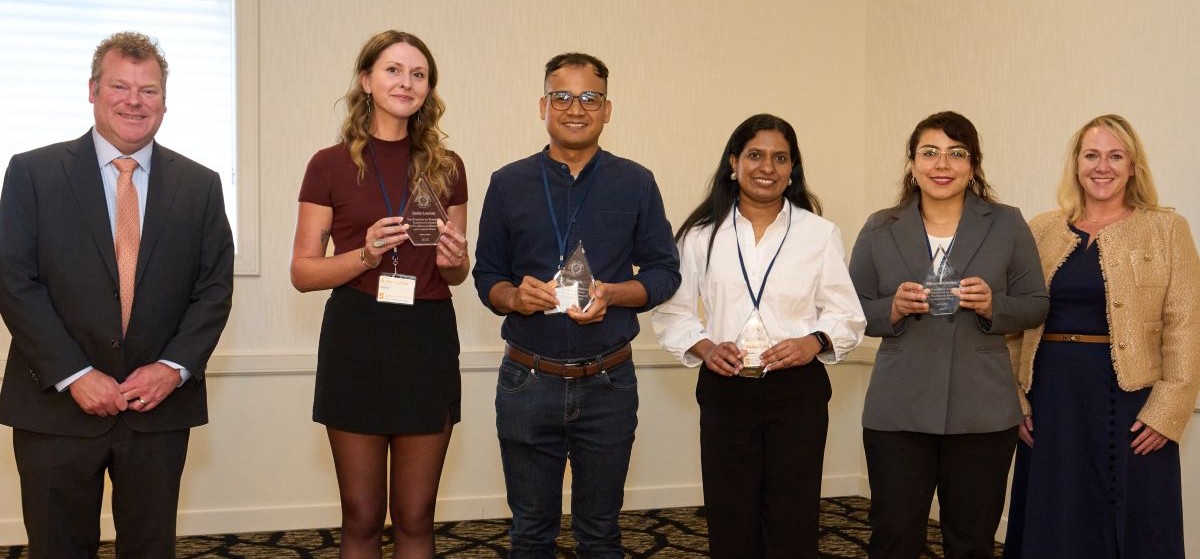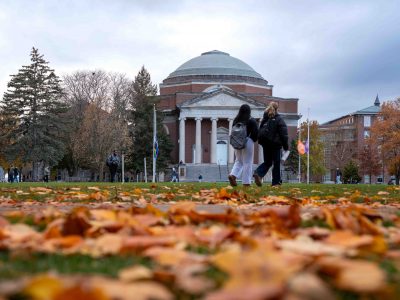
Beautiful blue-sky fall day image of multiple buildings on the University campus, looking at a high level across campus toward downtown Syracuse.
University Honors 4 Scholars During Postdoc Appreciation Week
As part of National Postdoctoral Association’s Postdoc Appreciation Week, the University’s Office of Postdoctoral Affairs and Graduate School celebrated the outstanding contributions of Syracuse postdoctoral scholars in research, creative initiatives, teaching and service work.
A total of 86 postdoctoral scholars are engaged in research and creative projects across 25 different programs and departments at the University.
Four researchers were awarded special Vice President for Research Postdoctoral Awards for Excellence in Research and Creative Work, each earning $750 and presenting their projects at the Postdoctoral Appreciation Dinner Sept. 19:
- India Luxton, Geography and the Environment, Maxwell School of Citizenship and Public Affairs
- Miryam Nacimento, Engaged Humanities, College of Arts and Sciences
- Sao Puth, Biomedical and Chemical Engineering, College of Engineering and Computer Science
- Sisila Valappil, Chemistry, College of Arts and Sciences

Luxton examines how institutional, political and organizational changes shape federal agencies’ ability to fulfill their public missions. Her project, “The Fracturing of Federal Oversight: Politics, Diminished Regulatory Capacity and Public Harm,” uses interviews with federal employees to document how underfunding, understaffing and fragmented oversight undermine agency effectiveness and public protections. With a U.S. Department of Agriculture National Institute of Food and Agriculture fellowship, she is studying interagency coordination and collaboration.
Nacimento works with farmers in Cauca, Colombia, to help them reclaim their cultural identity by cultivating a once-criminalized plant for use as a natural dye. Her project, “ Small Farmers, Multiculturalism and the War on Drugs in Colombia,” blends storytelling, art and farming to challenge inequality and reclaim cultural history, promote community control of the food system and produce healthy, sustainable, culturally meaningful food.
In “Greasing Protein Wheels: Unlocking Lipidation Strategies for Next-Generation Biomaterials and Therapeutics,” Valappil explores how attaching lipid molecules to proteins can alter their behavior and interactions with cells. By changing where lipids are attached, scientists can control how proteins shape the space around cells to help guide how the cells grow, move or heal. The work of engineering smart protein systems could transform treatments for diseases like cancer.
Puth develops nanoparticles coated with immune cell membranes and, using antigen-specific therapy, trains the body’s defenses to target and attack only harmful cells. His project, “Development of Dendritic Cell Membrane-Coated Nanoparticles for Antigen-Specific T Cell Engagement,” focuses on engineering nanomedicines for targeted drug delivery. His work spans infectious diseases, cancer and biomaterials-based immunotherapy. He previously worked at the Combinatorial Tumor Immunotherapy Medical Research Center and the Immunotherapy Innovation Center on therapeutic vaccines for cervical cancer.
The Office of Postdoctoral Affairs is part of the Office of Research. It leads efforts in hiring and onboarding postdoctoral scholars and works in collaboration with the Graduate School and campus partners to offer centralized resources and career development support for postdoctoral scholars across the University.


